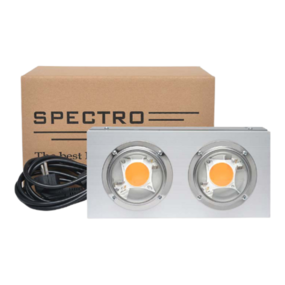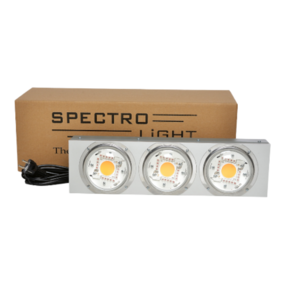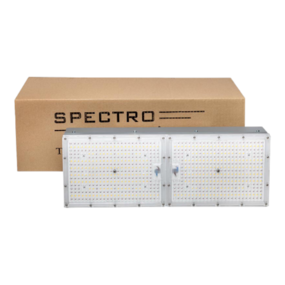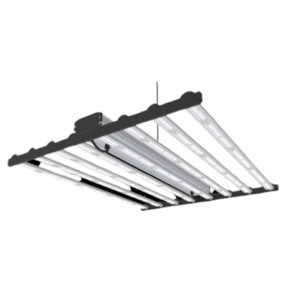Spectro Light LED grow lights
When it comes to providing your plants with the optimal lighting environment, LED grow lights are the way to go. LED (light-emitting diode) technology can provide plants with well-balanced light density and intensity levels, while also reducing energy consumption. However, with several different types of LED lighting solutions available, it can be difficult to decide which one is right for you. In this article, we will be discussing the pros and cons of three of the most popular types of LED grow lights available: Spectro Light LED, COB LED, and full-spectrum LED.
Spectro Light COB Grow Lights
Spectro Light LED grow lights are some of the most advanced lighting solutions on the market. These lights are designed to emit the specific wavelengths of light needed for plant growth, making them incredibly efficient for growing crops indoors. The high efficiency of these lights makes them ideal for tight, enclosed spaces, as they don’t require as much space or ventilation as other types of lighting solutions. Furthermore, Spectro Light LED grow lights are also relatively inexpensive.
Pros of Spectro Light LED Grow Lights
- High efficiency – Spectro Light LED grow lights are designed to emit the exact wavelengths of light needed for plant growth, making them highly efficient. • Low maintenance – These grow lights are relatively low maintenance, requiring only occasional cleaning and minimal wiring.
- Cost-Effective – Spectro Light LED grow lights are relatively inexpensive compared to other types of LED grow lights.
Cons of Spectro Light LED Grow Lights
- Limited range – The limited color spectrum of Spectro Light LED grow lights can be limiting for certain plants that need a wider range of colors for healthy growth.
- Less durable – These lights are not as durable as other types of LED lighting solutions, and the bulbs will have to be replaced more often.
• Power: 250 Watt
• Footprint: 80 x 80 cm
• Full-spectrum
• Fo
• Power: 250 Watt
• Footprint: 80 x 80 cm
• Full-spectrum
• Fo
• Power: 450 Watt
• Footprint: 120 x 120 cm
• Full-spectrum
•
• Power: 450 Watt
• Footprint: 120 x 120 cm
• Full-spectrum
•
• Power: 600 Watt
• Footprint: 150 x 150 cm
• Full-spectrum
• F
• Power: 600 Watt
• Footprint: 150 x 150 cm
• Full-spectrum
• F
• Power: 630 Watt
• Footprint: 120 x 120 cm
• Full-spectrum
• Fo
• Power: 630 Watt
• Footprint: 120 x 120 cm
• Full-spectrum
• Fo
Type Spectro Light LED grow lights
When it comes to providing your plants with the optimal lighting environment, LED grow lights are the way to go. LED (light-emitting diode) technology can provide plants with well-balanced light density and intensity levels, while also reducing energy consumption. However, with several different types of LED lighting solutions available, it can be difficult to decide which one is right for you. In this article, we will be discussing the pros and cons of three of the most popular types of LED grow lights available: Spectro Light LED, COB LED, and full-spectrum LED.
Spectro Light COB Grow Lights
Spectro Light LED grow lights are some of the most advanced lighting solutions on the market. These lights are designed to emit the specific wavelengths of light needed for plant growth, making them incredibly efficient for growing crops indoors. The high efficiency of these lights makes them ideal for tight, enclosed spaces, as they don’t require as much space or ventilation as other types of lighting solutions. Furthermore, Spectro Light LED grow lights are also relatively inexpensive.
Pros of Spectro Light LED Grow Lights
- High efficiency – Spectro Light LED grow lights are designed to emit the exact wavelengths of light needed for plant growth, making them highly efficient. • Low maintenance – These grow lights are relatively low maintenance, requiring only occasional cleaning and minimal wiring.
- Cost-Effective – Spectro Light LED grow lights are relatively inexpensive compared to other types of LED grow lights.
Cons of Spectro Light LED Grow Lights
- Limited range – The limited color spectrum of Spectro Light LED grow lights can be limiting for certain plants that need a wider range of colors for healthy growth.
- Less durable – These lights are not as durable as other types of LED lighting solutions, and the bulbs will have to be replaced more often.




